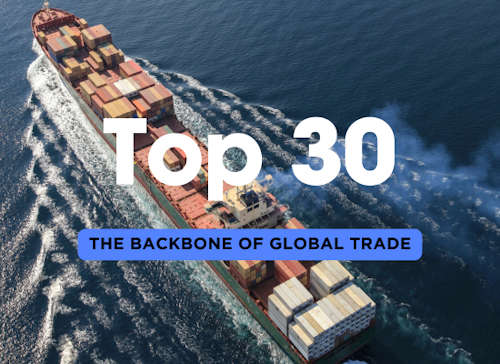Top 30 Reasons Why Maritime Shipping is the Backbone of Global Trade

Maritime shipping is the cornerstone of global trade, responsible for the transportation of over 80% of the world’s goods by volume. This vast industry enables the movement of essential commodities, manufactured goods, and raw materials across the globe, keeping economies connected and thriving.
** This list is intended for informational and entertainment purposes only. The statistics presented may vary over time and could be outdated or inaccurate. We recommend verifying the data for accuracy.
1. Handles Over 80% of Global Trade 🌍
Maritime shipping is responsible for transporting the vast majority of goods traded internationally, including energy products, agricultural goods, machinery, and electronics. Its ability to handle massive cargo volumes makes it the most reliable and efficient mode of global transportation. Without it, countries would face significant barriers to accessing necessary imports and markets for exports.
Statistics: According to the International Maritime Organization (IMO), around 11 billion tons of goods are transported by sea annually, accounting for over 80% of world trade by volume and more than 70% by value.
2. Cost-Effective for Large Volumes 💸
Shipping by sea is the most economical way to move large quantities of goods over long distances. Container ships, bulk carriers, and tankers can transport vast amounts of cargo at a fraction of the cost compared to air or land transport. This makes maritime shipping essential for industries that deal with high-volume goods, such as agriculture, mining, and manufacturing.
Statistics: Shipping costs can be as low as $0.03 per ton-mile, making it significantly cheaper than air freight, which averages around $0.80 per ton-mile.
3. Essential for Global Supply Chains 🏗️
Modern supply chains are intricately linked to maritime shipping. It ensures the timely movement of raw materials and finished products, from energy commodities like oil and gas to consumer goods like electronics and clothing. Disruptions in maritime shipping can have cascading effects on supply chains, leading to delays, shortages, and increased costs.
Statistics: Approximately 90% of global trade in energy, including oil and liquefied natural gas (LNG), is transported by sea, making maritime shipping essential for keeping global energy supplies stable.
4. Environmentally Efficient for Long Distances 🌱
Maritime shipping is one of the most environmentally efficient modes of transportation, especially when moving large quantities of goods over long distances. Although ships do emit greenhouse gases, the carbon emissions per ton-mile are lower compared to other forms of transport, such as air and road. The industry is also taking steps to adopt greener technologies, including cleaner fuels and more fuel-efficient ship designs.
Statistics: The shipping industry accounts for about 2.2% of global carbon dioxide emissions, significantly lower than road transport (12%) and air transport (2.5%) in terms of total emissions.
5. Supports International Trade Agreements 📜
Maritime shipping is the backbone of international trade agreements, facilitating the exchange of goods between countries and enabling the smooth execution of global trade deals. Without maritime shipping, the benefits of free trade agreements and global commerce would be severely limited, as countries would struggle to move goods cost-effectively across borders.
Statistics: Trade volumes in free trade areas like the European Union rely heavily on maritime routes, with nearly 40% of intra-EU trade by volume handled by ships, showcasing the critical role shipping plays in international trade.
6. Enables Globalization of Manufacturing 🌍
Maritime shipping makes it possible for companies to manufacture goods in one part of the world and sell them in another. This allows businesses to take advantage of lower production costs in countries with cheaper labor and resources, then export those goods to high-demand markets. Without maritime shipping, global manufacturing hubs like China, India, and Southeast Asia would be far less connected to the rest of the world.
Statistics: Over 60% of global maritime trade consists of containers that transport manufactured goods, such as electronics, textiles, and machinery.
7. Facilitates Trade in Bulk Commodities 🛢️
Maritime shipping is essential for the movement of bulk commodities like oil, coal, grains, and minerals. These heavy, voluminous goods would be impossible to transport efficiently by air or road. Bulk carriers and tankers are specifically designed to carry these commodities in large quantities across the oceans, ensuring supply to industries and consumers worldwide.
Statistics: Bulk cargoes account for about 40% of global maritime trade, with crude oil alone making up nearly 20% of that volume.
8. Adaptable to Various Cargo Types 🚢
One of the major strengths of maritime shipping is its versatility. Ships can be adapted to carry all types of cargo, from liquid bulk (like oil) to dry bulk (like grain and coal), as well as containerized goods and specialized cargo (such as automobiles or heavy machinery). This flexibility makes it the go-to solution for transporting diverse goods worldwide.
Statistics: The global merchant fleet consists of over 50,000 ships of various types, including container ships, tankers, bulk carriers, and roll-on/roll-off vessels, each designed to meet the specific needs of different industries.
9. Supports Economic Growth in Developing Countries 📈
Maritime shipping plays a critical role in supporting the economic development of emerging markets by providing access to global trade networks. Developing countries often rely on exports of raw materials and imports of manufactured goods to grow their economies. Shipping links these countries to international markets, enabling economic expansion and job creation.
Statistics: Developing economies account for over 60% of global seaborne trade by volume, with their share continuing to grow as they integrate further into the global trading system.
10. Critical for Humanitarian Aid and Disaster Relief 🤝
In times of crisis, maritime shipping is often the fastest and most effective way to deliver large quantities of humanitarian aid, including food, water, medical supplies, and shelter materials. Ships can reach affected areas, especially islands and remote regions, where air or land transportation is not feasible. Maritime shipping plays a crucial role in international disaster relief efforts and ongoing humanitarian support.
Statistics: During the 2010 Haiti earthquake, over 80% of international aid was delivered by sea, highlighting the importance of maritime shipping in global relief efforts.
11. Reduces Congestion on Land-Based Transport Networks 🚛
Maritime shipping alleviates pressure on road, rail, and air transportation systems by carrying massive volumes of goods that would otherwise overwhelm land-based networks. Without shipping, land and air routes would face extreme congestion, leading to inefficiencies, delays, and increased transportation costs.
Statistics: The global container shipping fleet moves over 800 million TEUs annually, which would require millions of trucks or rail cars to transport the same volume over land, highlighting the crucial role of maritime shipping in preventing congestion.
12. Key Role in Energy Transportation ⚡
Maritime shipping is indispensable for the global transportation of energy resources, including crude oil, natural gas, and coal. Specialized vessels like oil tankers and LNG carriers ensure a steady flow of energy resources to meet the world’s growing energy demands.
Statistics: Roughly 60% of the world’s crude oil is transported by sea, and the global fleet of LNG carriers transported nearly 400 million metric tons of liquefied natural gas in 2022, underscoring the critical role shipping plays in energy supply.
13. Promotes International Collaboration 🌐
The international nature of maritime shipping fosters collaboration between nations, as ports, shipping lines, and trade routes connect economies across continents. This interconnectedness encourages countries to work together on issues like port efficiency, trade agreements, and anti-piracy initiatives.
Statistics: Over 150 countries are actively involved in the shipping industry, with 90% of global trade relying on international sea routes, making collaboration between nations a necessity for global economic stability.
14. Drives Innovation in Shipping Technology 🚀
The shipping industry is a catalyst for innovation in areas like fuel efficiency, autonomous ships, and green technologies. Companies are constantly developing new technologies to improve vessel performance, reduce emissions, and lower costs.
Statistics: The global autonomous ship market is projected to grow to $13.8 billion by 2030, driven by advancements in AI, robotics, and navigation systems designed to make shipping safer and more efficient.
15. Provides Critical Employment Opportunities Worldwide 👷♂️
The maritime shipping industry is a significant source of employment for millions of people globally, including seafarers, port workers, shipbuilders, and logistics professionals. It supports entire communities that rely on the shipping industry for economic stability and growth.
Statistics: The International Chamber of Shipping (ICS) estimates that the shipping industry employs over 1.7 million seafarers worldwide, in addition to millions of jobs onshore in ports and associated industries.
16. Enables Efficient Movement of Raw Materials 🏗️
Maritime shipping is essential for transporting raw materials like iron ore, copper, and timber, which are vital for global industries. Ships are the only feasible way to move these heavy and bulky commodities in the quantities required for manufacturing and construction.
Statistics: Over 3 billion metric tons of iron ore are transported by sea each year, supporting the steel industry, which is critical for infrastructure development around the world.
17. Ensures Reliable Global Food Supply 🍎
Shipping is a crucial part of the global food supply chain, allowing countries to import and export food products, ensuring year-round availability of fresh produce, grains, and other essentials. Countries dependent on imports for staple foods like rice, wheat, and corn rely heavily on maritime shipping.
Statistics: Approximately 1.7 billion tons of food are transported by sea annually, including 400 million tons of grains such as wheat and corn, which are essential for food security.
18. Central to Global Fisheries and Seafood Trade 🐟
The fishing industry heavily depends on maritime shipping for both the harvesting and transportation of seafood. Large fishing vessels operate in international waters, and once the fish are caught, they rely on shipping to distribute the seafood to global markets.
Statistics: Global seafood trade generates around $150 billion annually, with over 90% of fish and seafood transported by sea.
19. Supports the Development of Coastal Economies 🏝️
Coastal economies, particularly in developing regions, benefit immensely from maritime shipping. Ports act as economic hubs, creating jobs and stimulating trade. Coastal regions often depend on shipping to connect with the rest of the world, boosting tourism, fishing, and export industries.
Statistics: Over 38% of the global population lives within 100 km of the coast, with many coastal communities relying on shipping-related industries for economic growth and development.
20. Critical for Offshore Energy Development 🛢️
Maritime shipping plays an essential role in supporting offshore energy projects, such as oil drilling and wind farms. Specialized vessels are used for the installation, maintenance, and supply of offshore energy infrastructure, helping meet global energy demands.
Statistics: Offshore oil production accounts for approximately 30% of the world’s crude oil output, and the global offshore wind market is projected to grow to $87.5 billion by 2026.
26. Promotes Global Economic Integration 🌎
Maritime shipping connects countries across continents, enabling the free flow of goods and fostering international trade. This interconnection promotes economic integration by allowing countries to specialize in production, leading to more efficient global markets.
Statistics: In 2021, the total value of global merchandise trade reached $28.5 trillion, with maritime shipping facilitating the majority of this exchange.
27. Reduces Transportation Costs for Businesses 💼
Shipping by sea is the most cost-effective method for transporting large quantities of goods, reducing costs for businesses and allowing companies to remain competitive in global markets. This lower cost of transportation helps businesses pass savings on to consumers, benefiting economies worldwide.
Statistics: Transporting goods by sea is approximately four to six times cheaper than air freight, depending on the route and cargo type.
28. Plays a Role in Reducing Global Poverty 💸
By connecting developing countries to international markets, maritime shipping helps reduce global poverty. Shipping enables these countries to export raw materials and import affordable goods, creating jobs and stimulating economic growth.
Statistics: Maritime trade contributes to the livelihoods of hundreds of millions of people in developing countries, supporting jobs in shipping, agriculture, and manufacturing.
29. Powers the Global Tourism Industry 🏖️
Cruise ships and passenger ferries play a vital role in the global tourism industry, transporting millions of travelers each year and contributing billions of dollars to local economies. Coastal tourism, in particular, depends on the efficient and safe operation of maritime vessels.
Statistics: The global cruise industry generated over $55 billion in revenue in 2019, with over 30 million passengers traveling by sea.
30. Critical for the Transportation of Specialized Goods 🚜
Maritime shipping is essential for transporting specialized and oversized goods like heavy machinery, wind turbines, and industrial equipment. Ships are often the only viable means of moving these types of cargo due to their size and weight, making them crucial to industries like construction, energy, and agriculture.
Statistics: The global heavy-lift shipping market is valued at over $11 billion, with thousands of shipments of oversized and specialized cargo transported by sea each year.
Maritime shipping is truly the backbone of global trade, playing a central role in moving goods, powering economies, and connecting people and industries across the world. From facilitating global supply chains to reducing transportation costs and supporting developing economies, the shipping industry’s impact on international commerce cannot be overstated. As we continue to innovate and address challenges like sustainability and efficiency, maritime shipping will remain a crucial part of our global infrastructure, ensuring the smooth flow of goods for generations to come.
Additional References
UNCTAD – Review of Maritime Transport 2022
- URL: https://unctad.org/webflyer/review-maritime-transport-2022
- Description: The United Nations Conference on Trade and Development (UNCTAD) provides an annual review of maritime transport, offering key insights and statistics about global shipping trends, seaborne trade volumes, and challenges facing the maritime industry.
International Maritime Organization (IMO) – Key Issues
- URL: https://www.imo.org/en/OurWork/Pages/Home.aspx
- Description: The International Maritime Organization (IMO) is a specialized agency of the United Nations responsible for regulating shipping. Their website covers key topics such as safety, environmental protection, and global shipping regulations, with frequent updates and reports.
World Shipping Council – Industry Data and Statistics
- URL: https://www.worldshipping.org/industry-issues/global-trade/industry-data
- Description: The World Shipping Council provides comprehensive data on the global container shipping industry, covering trade volumes, industry growth, and environmental initiatives. This resource is useful for understanding the economic and operational impact of containerized shipping.
Statista – Maritime Industry Statistics
- URL: https://www.statista.com/topics/1367/maritime-industry/
- Description: Statista offers up-to-date statistics and industry insights on the maritime industry, including global trade, shipbuilding, shipping companies, and port operations. It’s a valuable resource for tracking trends and data in maritime logistics.
Lloyd’s List – Maritime News and Data
- URL: https://lloydslist.maritimeintelligence.informa.com/
- Description: Lloyd’s List is one of the oldest and most respected sources for maritime shipping news and data. It provides industry analysis, market trends, and updates on shipping regulations and technology innovations.

Do you have a Maritime Product or Service that may be of interest to Shipowners? Tell us about it here!
Do you have feedback or insights? Please reach out to editor @ shipuniverse.com



